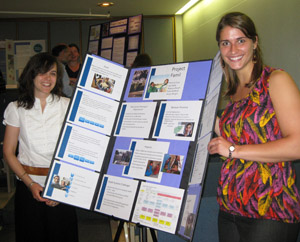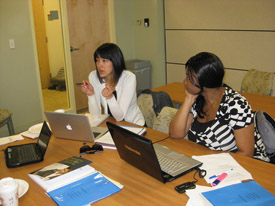BUSPH Summer Class Partners with NGO on Global Health Programming
The Boston University School of Public Health students enrolled in this summer’s IH 744: Design & Implementation of International Health Programs course may have completed their class assignments and turned in their final projects, but their work may not be done just yet.

For the course, students partnered with Circle of Health International (COHI), a non-profit that builds the capacity of women’s healthcare providers in crisis settings around the world, to work as programming consultants for the organization. Their charge: design a program that COHI could implement in an international setting that addresses maternal mortality. The final outcome of their work could potentially be implemented on the ground by COHI.
This was the first time the two-week summer course has been offered in collaboration with an international health organization that could potentially put students’ work into action, Associate Professor of International Health James Wolff said.
“We’ve been trying to develop more opportunities for practice-based learning linking the classroom to something real-world and useful,” said Wolff, who co-taught the course with Monita Baba Djara, academic services coordinator at BUSPH. “This was a really great fit.”
The organization, which was founded in 2004 by BUSPH alumna Sera Bonds, MPH ’07, connects volunteer public health practitioners, physicians, midwives and trauma specialists to serve on international field teams in conflicts or disasters that effect women. To further its mission, the NGO continues to identify and develop new programs, which is where the BUSPH students came in to lend their public health expertise.
Working as three consulting teams, students developed proposals for maternal and child health care programs in Afghanistan, Nigeria and Mali, and identified prospective funding sources that align with COHI’s mission. Their final projects will be presented to COHI’s board and may eventually be submitted to funders.

Students in the class said they found the project to be an invaluable experience. Just seeing what goes into writing a proposal made it “much more real,” said Sofia Redford. Her group proposed a program that would train midwives and community health workers in the Bamyan Province of Afghanistan to work with community councils and couples on family planning options and techniques.
“I like the idea of an extensive skills-based class,” she said. “I’m interested in program management and policy design so this was right up my alley.”
COHI Executive Director Leilani Johnson, MPH ’04, and Rachel Bedenbaugh, MPH ’10, an intern at the organization, worked closely with the class.
“We let them know what COHI is, what we do, and what we want to do,” Johnson said. The two were available throughout the duration of the course to answer any questions about the organization’s objectives.
Recalling her MPH training, Johnson said the experience was a great way to bridge the connection between course work and professional experience.
“You don’t usually get to write grant proposals for USAID straight out of grad school,” Johnson said. “It’s more likely that they would be for small organizations like COHI.”
In addition, working within the framework of an actual organization helped the students to develop programs with a reasonable scope.
“The students had to look at what is realistic for COHI and take the real world into account, which is really healthy,” said Cristin Marona, MPH ’10, who was the teaching assistant for the course. “Working with a real NGO made it pressing for them to get it right.”
For Zainab Shuaib and her group, that meant rethinking their initial program plan for tackling maternal mortality in Katsina State, Nigeria. It was too close to a program that the country’s government already has in place.
If this was a hypothetical project “we could have just continued,” Shuaib said. “But we wanted to do something that would make an impact.” Shuaib’s group proposed a program to train midwives and traditional birth attendants to educate community members on family planning services.
The third consulting team created a proposal to improve conditions for pregnant women in Hombori, Mali. Their program would build the capacity of healthcare-delivery personnel in the village’s community health centers, which are currently underequipped to meet the needs of expectant mothers. In addition to training, they would provide much needed medical supplies to the facilities.
According to the course instructors and their COHI partners, students’ final projects exceeded all expectations.
“I didn’t anticipate the extent to which students would get invested in the work,” Wolff said. “They learned so much about the countries they were developing programs for, it was really impressive. They blurred the boundaries between school and professional interest.”
Bedenbaugh agreed. “They really went above and beyond,” she said.
For Johnson, the next step is to bring the students’ final proposals to COHI’s board. The proposals that pass muster will then go out to potential funders. And if they get funded, Johnson said there might be another exciting opportunity for the students.
“We just might be able to hire them to work on the projects,” she said.
Submitted by Michelle Salzman